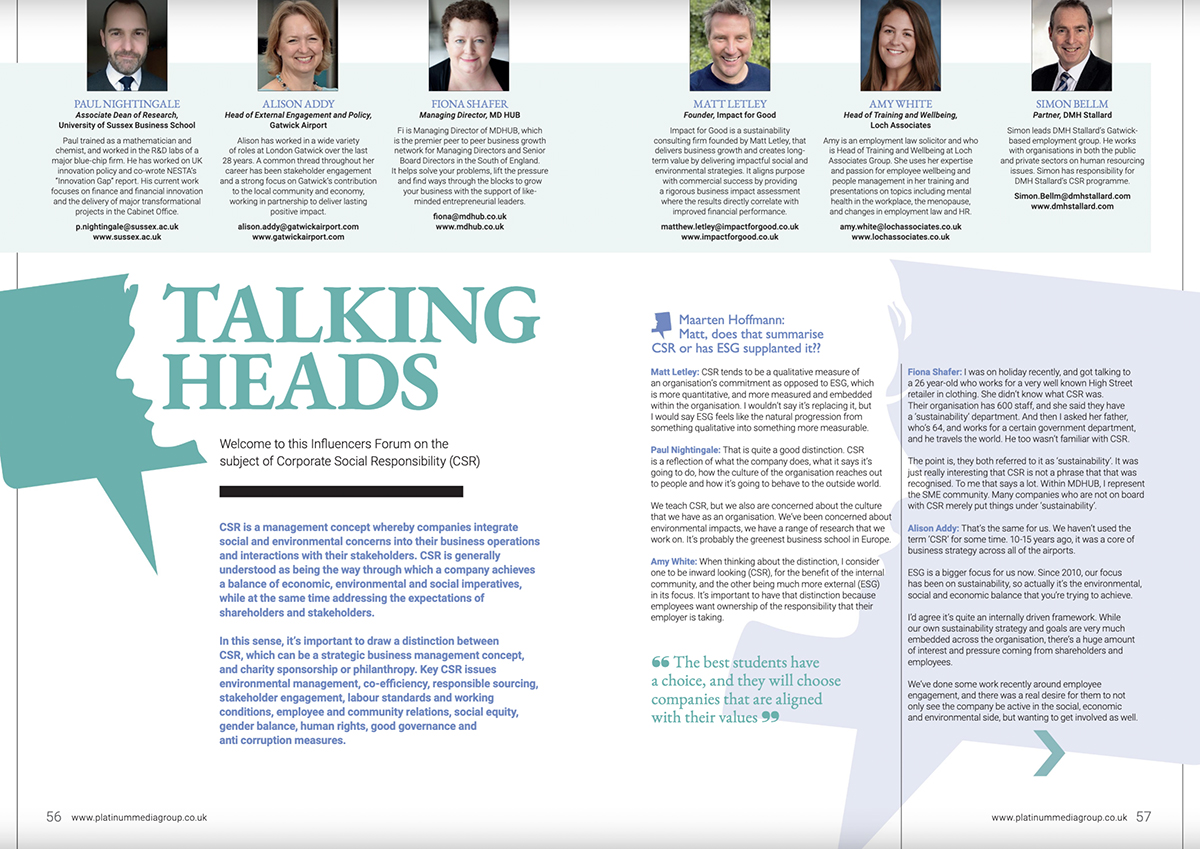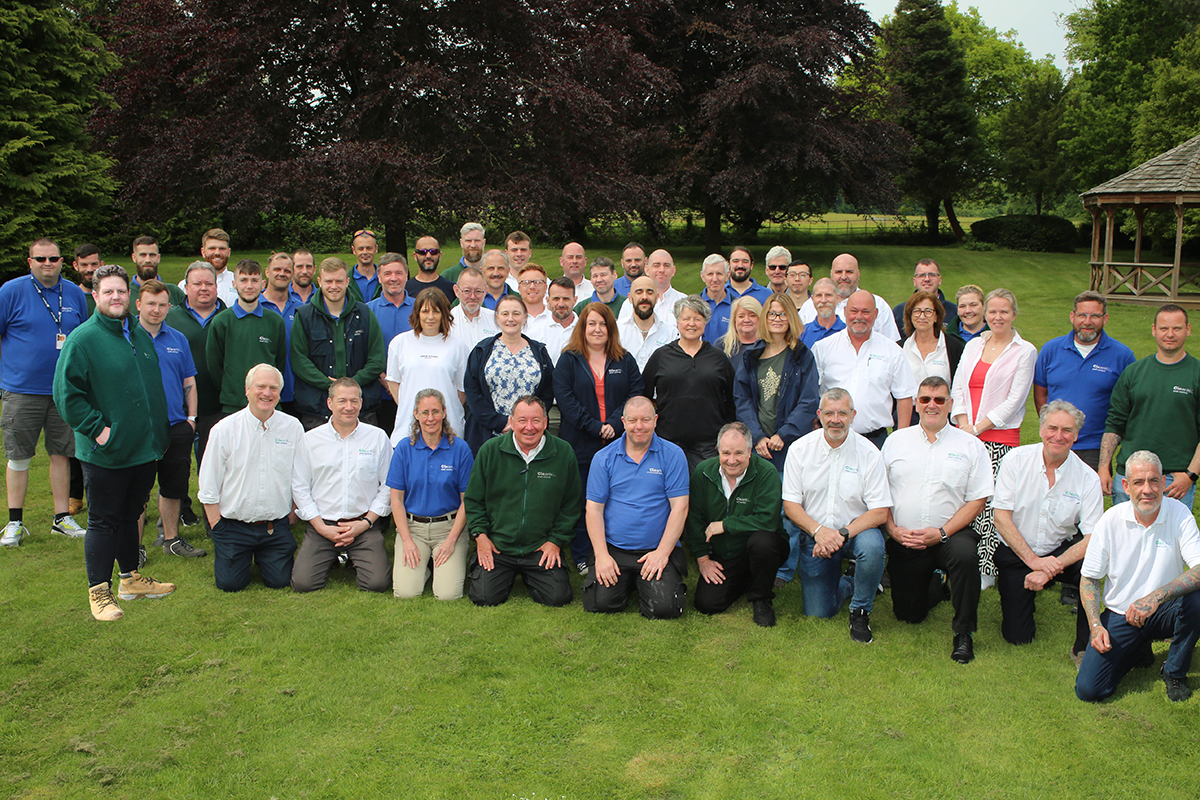
CSR is a management concept whereby companies integrate social and environmental concerns into their business operations and interactions with their stakeholders. CSR is generally understood as being the way through which a company achieves a balance of economic, environmental and social imperatives, while at the same time addressing the expectations of shareholders and stakeholders.
In this sense, it’s important to draw a distinction between CSR, which can be a strategic business management concept, and charity sponsorship or philanthropy. Key CSR issues environmental management, co-efficiency, responsible sourcing, stakeholder engagement, labour standards and working conditions, employee and community relations, social equity, gender balance, human rights, good governance and anti corruption measures.
Maarten Hoffmann: Matt, does that summarise CSR or has ESG supplanted it?
Matt Letley: CSR tends to be a qualitative measure of an organisation’s commitment as opposed to ESG, which is more quantitative, and more measured and embedded within the organisation. I wouldn’t say it’s replacing it, but I would say ESG feels like the natural progression from something qualitative into something more measurable.
Paul Nightingale: That is quite a good distinction. CSR is a reflection of what the company does, what it says it’s going to do, how the culture of the organisation reaches out to people and how it’s going to behave to the outside world.
We teach CSR, but we also are concerned about the culture that we have as an organisation. We’ve been concerned about environmental impacts, we have a range of research that we work on. It’s probably the greenest business school in Europe.
Amy White: When thinking about the distinction, I consider one to be inward looking (CSR), for the benefit of the internal community, and the other being much more external (ESG) in its focus. It’s important to have that distinction because employees want ownership of the responsibility that their employer is taking.
Fiona Shafer: I was on holiday recently, and got talking to a 26 year-old who works for a very well known High Street retailer in clothing. She didn’t know what CSR was. Their organisation has 600 staff, and she said they have a ‘sustainability’ department. And then I asked her father, who’s 64, and works for a certain government department, and he travels the world. He too wasn’t familiar with CSR.
The point is, they both referred to it as ‘sustainability’. It was just really interesting that CSR is not a phrase that that was recognised. To me that says a lot. Within MDHUB, I represent the SME community. Many companies who are not on board with CSR merely put things under ‘sustainability’.
Alison Addy: That’s the same for us. We haven’t used the term ‘CSR’ for some time. 10-15 years ago, it was a core of business strategy across all of the airports.
ESG is a bigger focus for us now. Since 2010, our focus has been on sustainability, so actually it’s the environmental, social and economic balance that you’re trying to achieve.
I’d agree it’s quite an internally driven framework. While our own sustainability strategy and goals are very much embedded across the organisation, there’s a huge amount of interest and pressure coming from shareholders and employees.
We’ve done some work recently around employee engagement, and there was a real desire for them to not only see the company be active in the social, economic and environmental side, but wanting to get involved as well.
MH: You mention pressure from the shareholders. Would your shareholders be prepared to accept lower profits to achieve ESG or CSR goals?
ML: I’ve run a company that took them on a journey to B Corp Certification. By going on that journey, and looking at ESG and CSR in a different way, you look at your business and see that there were profits you didn’t realise were there.
For instance, we significantly reduced our supply chain costs by speaking to our clients to say, do you actually need the product delivered to your desk next day? ‘Well, actually, no, we don’t.’
Upon reviewing those supply chains, we realised how to consolidate, reduce our environmental impacts, and therefore reduce the cost to the clients. This then led to increased profits. What we needed to do was look at the business through a different lens.
SB: I think there’s a bit of a false premise of the question. I don’t think that the implication of having focus on either CSR or ESG is to reduce profits. Promoting CSR and ESG can mean better staff retention, or even improved customer retention. All of those can have a positive impact on profit.
You do also need to consider your company’s purpose – is it there solely to make a profit, or do you go beyond that? Shareholders do accept that the business is there for more than making a profit, so may well accept reduced terms where necessary.
MH: Alison, do you get pressure for CSR or ESG from the shareholders?
AA: Not pressure as such, but it is a core part of how they want to see the business developing. For example, our most recent sustainability strategy set a goal that we had to be Net Zero by 2040. However, the shareholders decided that wasn’t nearly ambitious enough. So we brought it forward 10 years.
In order to achieve that, they’ve had to commit to £250 million of investment over the next few years. So from an investor point of view, they’re prepared to make the step to drive the change that’s needed.
PN: If an organisation is good at CSR, it’s good at keeping clients. It’s a good indicator of high quality management. But for the very big firms, their shareholders are institutional shareholders; they’ve got very large portfolios. The costs of not enacting CSR falls on these shareholders much harder than it does for other shareholders. The organisations are therefore under a lot of pressure, and they need to manage this transition towards a greener economy.
MH: Within education, how are you teaching CSR?
PN: We try and embed CSR and ESG into everything we do; courses, instilling it into students’ critical thinking and awareness. This is what they want. Additionally, when they leave, if you as an organisation wants to employ someone in their 20s, and you are not aligned with important changes in society, you are going to struggle. The best students have a choice, and they will choose companies that are aligned with their values.
And because employers and students want that, we respond to it, and teach it. It’s a much more proactive thing than it was 10 years ago. If you don’t deliver to University of Sussex students, they will hold you to account; it’s a very demanding environment.
MH: Amy, do you find that in your training role?
AW: Absolutely. In terms of attracting the best talent, it’s on the employers’ agenda, especially as people are more mindful when they’re seeking work. We make sure employers take into account all of these issues, encouraging them to review their policies when they need to.
MH: Fiona, with all the SMEs you represent is it a topic that continually rises to the top?
FS: We held a three month survey of SMEs from December last year. We asked what people wanted in order to develop their leadership skills.
During the pandemic, just getting through it was the primary concern for everyone, but now ESG and CSR are moving up the ladder, because they’re seeing the imperative from their supply chains. Within that, ESG is coming to the fore because of the metrics involved; it’s something very tangible. CSR, for many SMEs, is too nebulous.
ML: When I started my career 25 years ago, CSR was merely an add-on to the operation. Now it has moved on to much more than merely the CEO being seen to plant a tree for a photo op. Demands for compliance are coming in from all corners, and that mounting pressure means companies will always need to do more.
Any tenders that larger companies have to deal with demand some kind of quantitive measure to be considered for that project. It’s becoming more measurable, so your company has to take their compliance seriously.
MH: Alison, you have a logistical and PR challenge of aiming to be Net Zero by a certain date. Of course, you were talking about the airport rather than the aeroplanes being Net Zero. Did you feel the statement was risky at the time?
AA: We knew the context, and we knew we’d have to be really careful about how we communicated this. In hindsight, I should have said that when I made the statement. We are doing all we can to make the airport Net Zero.
However, when it comes to the aircraft fleet, it’s not 100% within our control. It doesn’t mean to say that we’re not also active in that area. But being part of the Sustainable Aviation Coalition means we’re working with the airlines, lobbying governments and looking at future technologies. But we can’t control everything.
MH: There are a few firms who use philanthropy as a cover for CSR. Just donating to charity now and then doesn’t cover it, does it?
SB: A lot of it is driven by employees as well as customers and consumers who, in turn, influence the major stakeholders who, in turn, influence the supply chain. These are clued-up people, so any element of dishonesty about your claims will be quickly spotted. The impact of that is far worse than any benefit you may strive for.
MH: How bad is it if you get found out for not doing this correctly?
ML: The advice I offer is never make outrageous claims that you can’t back up with evidence. It’s easy to make a claim – but one day, it could come back to bite you. Don’t get sucked in with what everyone else is claiming, make the statement as to where you’re at, and be authentic with your claims, and that will be fine. Stick to commenting your own journey.
MH: Paul, I presume the students are very switched on people?
PN: They’ve very switched on. They’re very aware of the cultures of organisations, and are a more proactive generation than those of 10 years ago.
MH: So it’s your students that are driving us as employees to get our house in order?
PN: It’s societal. For example, we are world leaders in offshore wind. You go to the Sussex coast, and you can witness this infrastructure and transformational shift in operation.
There are actually a lot of benefits of moving towards green energy, because it’s cheaper, meaning the cost of energy will go down - substantially. The collapsing cost of solar is just a remarkable shift.
SB: I’m not technically knowledgeable so do you think that’s a silent revolution – is that message from government getting across?
PN: The government isn’t showing off about offshore wind, and they should be. I literally don’t understand why we are not shouting from the rooftops. This is a big global market, and we are world leaders.
ML: While the UK has recently recorded its highest amount of energy being obtained from renewables, there is still the political will to invest in fossil fuels, and that isn’t going away just yet. Meanwhile, as well as we are doing for renewables, the transition to where we want to be is still huge.
PN: Onshore wind is also a political issue. There are many people in the Shires who don’t want wind turbines in their vicinity. But while there’s a UK moratorium on onshore sites, we’ve vastly improved the technology of offshore sites. It’s a bizarre success story.
SB: What do you think is driving that success?
PN: Having the technical skills at hand from working in offshore facilities, being world leaders in aerodynamics, excellent project management skills have all meant we have hit the sweet spot in the development of the industry. The political and financial will has also been vital.
MH: As an SME, what’s the easiest way to ensure that I’m CSR compliant?
ML: Being CSR compliant is largely self governed. So to a point it’s just doing something within your organisation around CSR, whether that be from the environmental or social side, or looking after employees’ wellbeing.
SB: For me, CSR is about how you engage with the community, and your role within it, whether those are environmental or people-led. None of this is new. Businesses will have had this on their mind for quite a while, albeit with a different consideration around it. Now there’s a different focus, and there’s much more noise about it.
AW: And maybe also consult with those communities. The more driven the action you take is, the more buy-in you will get and the more effective it will be from an environmental, ethical and economic standpoint.
SB: Shoreham Port Authority is very conscious about the impact that it has on the community, whether it’s green energy issues, transport, traffic flow – that is a large component of CSR.
AA: You need to ask yourself ‘how can I tailor my corporate strategy to the real needs of the community?’ Properly listening to those stakeholders to understand their priorities, and the needs of the area is key. The point about not throwing money at charities is fair enough, so consider a community investment strategy. That means you are setting aside funds that may well go to charities, but in a targeted way, that actually meets the needs of the community. You can meet your CSR goals in that way.
MH: A cynic might well point out that, for CSR or ESG, there’s no kitemark or certification; you’re marking your own homework. It’s all a bit vague.
ML: You could go all out for B Corp or Planet Mark or another framework available to organisations, but you do have to back up your claims. CSR or ESG is about the need to step up. If nothing else, external pressure will make you step up. It can be daunting to take those first few steps down that road, but if you don’t take them, you will get left behind.
MH: But anyone with B Corp status shouts it as loud as they can; they’re very proud. It’s not the same for ESG or CSR, is it?
SB: One of the barriers is the benchmarking process itself, and the creeping feeling that’s it’s a box-ticking exercise. It’s more important to understand what you are doing within the community, and supporting that – without the checklist process.
PN: The shift towards external audit means you have to do things asked of you from outside, meaning you end up with an air of cynicism about what appears to be a box-ticking exercise. Organisations need to avoid turning it into that. Rather than that, what the company does within the community needs to be driven by its internal culture.
MH: There are those who don’t care. I’ve heard it said by MDs that CSR is a luxury,
PN: There’s a long tail of firms that are struggling in all sorts of areas, and CSR is one of them. The risk of those doing badly at CSR is that, just by the nature of them doing things badly, they start to become reactive. So ideally, they need to become proactive, and start thinking about measuring actual metrics. From there, you can start to analyse and improve your performance. If you’re building capability with an organisation, it’s going to spill over into other areas such as employing people, retaining customers, and being able to communicate that you’re a capable organisation.
AW: The absence of a benchmark isn’t the issue regarding getting smaller organisations to engage with CSR. If they aren’t engaging with it, the culture of the company will mean they won’t have staff or they won’t get the top talent. Similarly, they won’t win tenders, so they’ll lose clients or customers. The reality of the situation will perpetuate them in that direction anyway, without a benchmark needing to come into force.
PN: Even without certification, there are benefits to informal benchmarking. Companies do talk to each other and cross-pollinate ideas, and they all learn from each other. That kind of benchmarking can be done formally, informally, or even casually, say, over a cup of coffee. When people move from firm to firm, they bring new ideas with them. That can be across a range of things, and not just CSR.
AW: Do you think that’s one of the real benefits of CSR that actually encourages even competitive businesses to collaborate?
PN: Collaboration can work, especially if you have the same issues - internally or externally. That sharing of knowledge is not just CSR, but CSR is an easy way of opening the door.
AA: CSR or ESG is, by its nature, diverse. Maybe it’s more appropriate to benchmark some of the key parts of that diversity. It’s more meaningful than just saying, ‘we’ve got the CSR badge because we’ve ticked the right boxes’.
We did a benchmarking exercise a few years ago. It was a really good learning curve for us to understand where you can drive most value and social impact. But it takes a lot of resource and time. We’d rather be deploying that resource rather than undertaking an exercise for the sake of getting a badge.
MH: The point about this becoming a tick box exercise, maybe that’s a negative thing but I suspect it will hoover
up the stubborn companies who don’t give a damn.
SB: They wouldn’t pick up that checklist in the first place.
MH: True, but it’s driven from inside, the staff will ensure that the boss has no choice.
AA: The perception can easily be broken down if that stubborn company talks to another business to find out what CSR means to them. ‘CSR’ makes it sound as if it’s for big corporates, not for SMEs.
MH: There’s differentiation too. CSR was once about differentiation. But once everyone achieves it, there’s
no longer that differential.
ML: There’s always been an element of that; those external factors and pressures are going to continue to drive that. When talking about CSR or ESG, there will be the innovators; others will jump on the bandwagon, others will miss out entirely and drift away. But there will always be organisations doing it for a reason beyond that profit, and that’s what’s going to continually drive the innovation.
MH: The previous Talking Heads discussion about ESG brought up something really interesting – natural capital accounting, which is that within your balance sheet, you should be reflecting the amount of natural capital you have.
ML: There’s a drive towards a regenerative economy. For example, a furniture manufacturer will now make a modular article that can be recycled, repurposed and re-used, rather than just having a 10-year warranty, thereby increasing its life value. The customer is going to be incentivised, the shareholder will be incentivised to sit on the balance sheet for longer. And also it’s going to have a much more impactful benefit to the environment.
MH: Does it help me to sell my SME if my CSR policies are in place and working?
FS: Absolutely. Prospective investors are looking for that, in order to invest in a company where they want to know, ‘what are you doing about this’ because this is the way forward.
MH: It’s always easy to kick at an open door, but there are those stubborn guys that really don’t care. What does one do about them?
FS: In today’s global market, I don’t think they’re going to have a choice because it’s going to overtake them, and they’re going to be left behind, and it’s not all about profit. Businesses have had the ISO standard and ISO 14,001, environmental standard, well before ESG. And so they have been working with this.
In my previous career, we got six waste companies together to minimise waste, saving them £600,000. That was due to a collaborative approach. But when it comes to environmental waste, why aren’t the government or local authorities presenting one clear message? Collaboration is made harder because there is still a lot of confusion out there.
The other thing was MDHUB sponsored the Dynamic Awards last year and we chose the CSR Award. The category was was so tough to decide because every entry had its own CSR interpretation, possibly exaggerated by the lack of a benchmark.
This year, we’ve sponsored Employer of the Year, and the winner’s approach was very much from the employee perspective. They asked their employees what their expectations are. They built a lot of their policies, community work, and buying practices around what the employees were saying to them. There’s a cultural change in the mindsets of business owners. From a CSR viewpoint, it’s very encouraging.
SB: Time I think is an important issue, because you look at other behavioural issues - Equality, Diversity and Inclusion (EDI) for example. It’s a journey which takes a long time. We had equal pay claims in the 1960s, and we’re still not there. We could be talking similar timescales here to get that last stubborn group.
PN: There always will be a part of that stubborn group where they’ll still pour battery acid down the drain; they won’t care. They’ll treat their employees how they see fit which, incidentally, only ever generates work for lawyers. But they are in a world that has changed around them, leaving them behind. Their customers have placed new demands on them that they can’t fulfil. Meanwhile, the rest of the local economy is moving in a positive direction.
FS: I suggest educate those who aren’t engaged in CSR or sustainability into realising that what they could be doing is exciting and innovative, not dull and a burden. Many of our children are being taught this subject in schools, and they’re coming home, educating us.
AA: It is saying to those entrepreneurs that it’s about unlocking additional value, not about constraining you. The opportunities there are endless.
AW: You could go down the route of telling them all the horror stories that could happen if they don’t engage; the tribunal claims they’ll face or the business they’ll lose. But does that negativity actually create proactivity? Probably not.
PN: A lot of research has been done about ‘good things, badly implemented’, and having bad outcomes. If you go into an organisation, and you insult the manager, those people aren’t happy with that, and can backfire. It must be done carefully. Else you could end up creating barriers.
MH: Moving on, creating shared value – CSV. The model was based on the idea that social welfare and corporate success are inextricably linked, and it’s probably similar to what we’ve been talking about. One of the most important things is to show ‘that stubborn group’ that this doesn’t cost you money. Is that something that you’re readily able to tell your client?
ML: I find it does open up hidden levers that you wouldn’t have otherwise seen. It does identify areas that actually generates profit. There are opportunities to embed strategies that will improve the environmental impact, meaning they are going to be better engaged within the community and society. And it will identify those areas to actually drive and improve profits.
On another note, I am seeing a lot more collaboration between companies, even tech firms or digital firms that are sat in the same room whilst they’re competing for the same work. They are generous with their time and advice, and are very transparent because they want to use their business for a purpose beyond just making that profit.
You see that collaboration in many different industries; the wine industry in England has a great amount of collaboration. They’re all coming together to increase and improve their sustainability for the greater good.
MH: Just to finish, give me a statement about CSR, either on why companies should be paying attention if they’re not, or why CSR should or should not be replacing ESG.
ML: It’s good for employees; you’re going to attract talent, you’re going to be reducing your impact on the environment, and all of that good stuff that you’re doing from an organisation you can recognise within the framework. It will give you a purpose, a structure and a direction to improve your ambitions within that area. From my own experience, it will drive profits as well.
PN: CSR is about better management which, in one area will affect other areas. You will be able to recruit people, you will have better relationships with your customers, deliver on time, reduce your risk, reduce your exposure to external shocks. It’s part of an essential bit of the managerial toolkit of firms operating in this area, they need to do it. And it doesn’t necessarily have to be costly.
AW: I would say doing good can help you do well.
SB: Focusing on CSR helps you to exercise key skills of innovation and collaboration.
FS: Very short - you can’t afford not to.
AA: You can’t stand still. Just because you’ve put together a lovely framework of how you’re going to operate and add value, you’ve actually got to be constantly innovating and collaborating to make sure you keep focus. Similarly, the external pressures aren’t standing still. So you’ve got to challenge yourself and bring the outside in to understand how you can continue to evolve.
MH: Thank you, ladies and gentlemen, I think we could have done this for hours, but thank you nonetheless.





